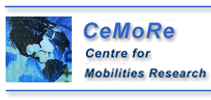

Connections, reflections, directions
The major talks from this conference are now available online - http://wp.lancs.ac.uk/mobilities-experiments/category/talks/
This workshop explores creative intersections between the mobilities paradigm, feminist theory, science and technology studies, media and cultural studies, design and art, looking for new insights and methodologies.
Multiple points of convergence exist between engaged citizenship, science, technology, public social science and design. They create opportunities and challenges for mobilities research and the social sciences more generally. Questions of purpose and method resonate with a sense that the present is a moment of enormous (‘global’, ‘planetary’, ‘systemic’) challenges and openings, in which ‘mobilities’ issues feature centrally, and to which mobilities research and a range of other approach aspire to respond.
This workshop seeks to generate conversations around the intersections between mobilities research and adjacent fields:
- What kinds of futures does engaged and inventive research at those intersections might help to generate?
- How is mobilities research ‘moving into’ futures?
- How is research shaping emergent configurations of relational, posthuman sociality-technicality-materiality-ethics?
- How can we gather momentum through dialogue between these adjacent fields?
We will be exploring these questions across of range of areas and research programmes that have considerable overlaps with mobilities research in their substantive concerns and broader social projects.
Many contemporary social science approaches are concerned with the lived practice and production of socio-material orders, while others chart important emergent issue areas, such as: disaster response; data flows and their (im)mobilities; or the gendered, newly racialised, and differently embodied (im)mobilities of inequality. These studies inevitably highlight how epistemologies, ontologies, ethics and politics are entangled in phenomena. Hence they show how path dependencies produce lock-ins, but also reveal hopeful monsters, switches, tipping points and alternative futures.
Relevant fields thus include: science and technology studies and non-representational theory (Barad 2007, Thrift 2007); theories of risk and cosmopolitanism (Beck 2009, Beck et al. 2013); securitization (Aradau 2004, Amoore 2006); disability studies (Parent 2013, Sawchuk 2013); cultural theory, feminist cultural theory and research creation (Goggin 2012, 2015, Chapman and Sawchuk 2012); ethnomethodology, participatory design and co-realization (Brown and O’Hara 2003, Laurier 2004, Buscher 2006, Hartswood et al 2001); mobilities theory and mobile methods (Sheller and Urry 2006, Buscher, Urry and Witchger 2011, Kesselring 2006, Freudendahl 2009); inventive methods (Lury and Wakeford 2012), mobilities design (Jensen 2014), speculative and critical design (Gaver, Dunne and Pacenti 1999, Wilkie and Michael 2009, Galloway 2014) and critical making (Ratto et al. 2014); transition theory (Schot 2012); crisis informatics research (Palen et al 2009, 2010); and and mobilities and race (Nicholson 2014).
How can intersections, syntheses, or even frictions between mobilities research and these adjacent theoretical perspectives (and others besides) lead to deeper and more useful insights that inform theoretical, methodological, epistemological and critical, creative future-making moves in the social sciences and beyond?
The workshop is designed to facilitate discussion and writing for a special issue of the Mobilities journal (http://www.tandfonline.com/loi/rmob20). Participation is limited to 30 participants.

| Programme | Registration | Travel and Accommodation | Contact Us |
Tel: +44 (0) 1524 592680 Fax: +44 (0) 1524 594256 E-mail: Pennie Drinkall



